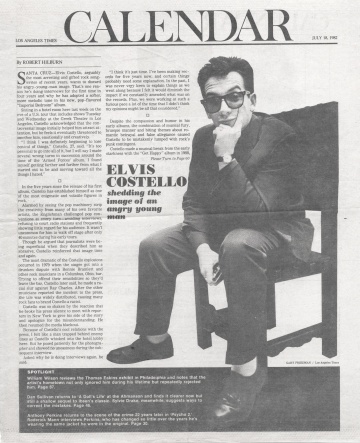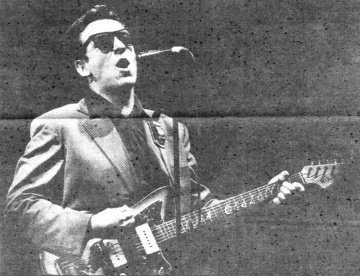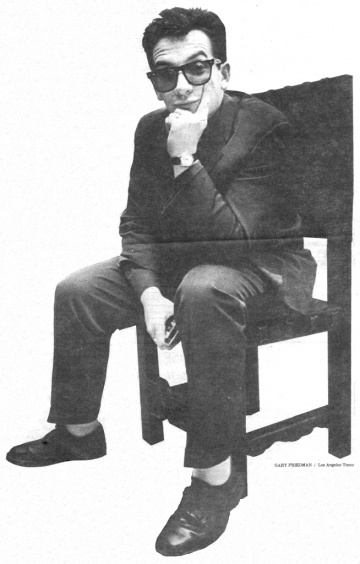Los Angeles Times, July 18, 1982: Difference between revisions
(+text part 1) |
(+text part 2) |
||
| Line 18: | Line 18: | ||
In the five years since the release of his first album, Costello has established himself as one of the most enigmatic and volatile figures in rock. | In the five years since the release of his first album, Costello has established himself as one of the most enigmatic and volatile figures in rock. | ||
Alarmed by seeing the pop machinery strip the creativity from many of his own favorite artists, the Englishman challenged pop conventions at every | Alarmed by seeing the pop machinery strip the creativity from many of his own favorite artists, the Englishman challenged pop conventions at every turn — avoiding interviews. refusing to court radio stations and frequently showing little regard for his audience. It wasn't uncommon for him to Walk off stage after only 40 minutes during his early tours. | ||
Though he argued that journalists were being superficial when they described him as abrasive, Costello reinforced that image time and again. | Though he argued that journalists were being superficial when they described him as abrasive, Costello reinforced that image time and again. | ||
| Line 35: | Line 35: | ||
Despite the compassion and humor in his early albums, the combination of musical fury, brusque manner and biting themes about romantic betrayal and false allegiance caused Costello to be mistakenly lumped with rock's punk contingent. | Despite the compassion and humor in his early albums, the combination of musical fury, brusque manner and biting themes about romantic betrayal and false allegiance caused Costello to be mistakenly lumped with rock's punk contingent. | ||
Costello made a musical break from the early starkness with the ''Get Happy'' album in 1980, | Costello made a musical break from the early starkness with the ''Get Happy'' album in 1980, substituting a lighter, Memphis R&B feel. He made additional steps away from the aggressive tone of the early LPs with 1981's ''Trust'' and, especially, the all-country ''Almost Blue''. | ||
In his live shows, too, Costello has become far less combative on stage, frequently thanking the audience and even (gulp) smiling. | |||
Costello's latest musical move comes in the new ''Imperial Bedroom''. | |||
Rather than emphasize the big beat, Costello and producer Geoff Emerick (a former Beatles studio aide) focus on vocal nuances and stylish production touches that are reminiscent in places of the Beatles' ''White Album''. | |||
Without sacrificing the tension of most Costello recordings, the music this time centers on many of the sophisticated elements of pre-rock pop. They range from the accordion-assisted flavor of "The Long Honeymoon" to the torchlike tone of "Almost Blue." | |||
And the lyrics contain enough classy and inventive rhymes to suggest that Declan McManus (Costello's real name) might have adopted the stage name "Cole" (as in Porter) if he had lived in an earlier pop era. | |||
Here are four examples — from different songs — of Costello's lyric approach: | |||
''So in this almost empty gin palace / Through a two-way looking glass / You see your Alice | |||
''There's been a long honeymoon / She thought too late and spoke too soon | |||
''Don't get smart or sarcastic/He snaps back just like elastic | |||
''Almost blue / Almost doing things we used to do / There's a girl here and she's almost you. ... | |||
The last set of lyrics is from the new album's "Almost Blue," a ballad with the stamp of a standard on it. While most of the other tunes on ''Imperial Bedroom'' are more idiosyncratic, there's an ambitiousness and scope in the LP's bending of pop traditions that is breathtaking at times. | |||
Coupled with his seven earlier albums, the new collection represents a creative explosion perhaps unmatched for quality and quantity in rock since Dylan's mid' '60 period. | |||
Costello was just 22 when his first album, ''My Aim Is True'', was released in 1977, but he seemed unusually impatient for attention, all but snarling at the British pop industry for not acknowledging his talent earlier. | |||
Like much of Dylan's material, Costello's songs frequently unleashed anger and aggression. Many of the tunes seemed to be almost obsessive attempts to avenge past slights and injustices. But he also seemed to be striking out at the potential weaknesses in his own character. | |||
The key to Costello's promise was his range. "Alison," for instance, was a splendidly designed tale of romantic disillusionment. Later recorded by Linda Ronstadt, the ballad exhibited a naked tenderness rare in any areas of pop, much less the high assault of rock. | |||
Plus, there was the disarming humor | |||
{{cx}} | {{cx}} | ||
Revision as of 22:46, 3 April 2014
|
Photos by Gary Friedman.
|






